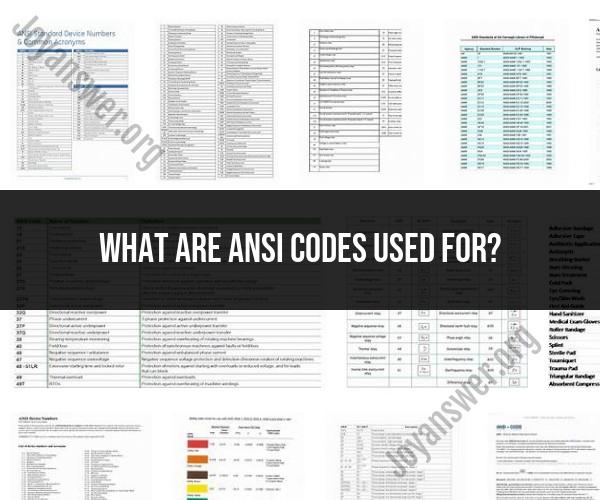What are ANSI codes used for?
ANSI (American National Standards Institute) codes, also known as ANSI standards, are used in various industries and fields to establish consistent standards and guidelines for products, processes, and systems. The use of ANSI codes is significant for the following reasons:
Standardization: ANSI codes facilitate standardization, ensuring that products, systems, and processes meet consistent quality and safety criteria. This benefits consumers by ensuring that products from different manufacturers are compatible and meet minimum requirements.
Safety: ANSI codes often include safety standards that help protect workers, consumers, and the general public. For example, ANSI standards for personal protective equipment (PPE) help ensure the safety of workers in various industries.
Interoperability: In technology and engineering, ANSI codes often define communication protocols and data formats that enable different devices and systems to work together seamlessly. This promotes interoperability and compatibility.
Quality Assurance: ANSI codes are used to establish quality management and assurance standards. Organizations can follow these standards to ensure their products and services meet or exceed customer expectations.
Environmental Impact: ANSI standards may include guidelines for environmental sustainability and reducing the environmental impact of products and processes. This is increasingly important in today's environmentally conscious world.
Regulatory Compliance: Many industries are subject to regulatory requirements. ANSI codes often serve as a basis for these regulations, helping organizations comply with legal and safety standards.
Market Access: Following ANSI standards can be essential for accessing certain markets. Many government contracts and industry certifications require compliance with specific standards.
Innovation: ANSI codes evolve to incorporate technological advancements and best practices. This encourages innovation and continuous improvement in various industries.
Risk Reduction: By adhering to ANSI standards, organizations can reduce the risk of product failures, accidents, and legal liabilities.
Global Trade: ANSI codes are often aligned with international standards or have global counterparts (e.g., ISO standards). This harmonization facilitates international trade and cooperation.
Consumer Confidence: Consumers have confidence in products and services that meet recognized standards. ANSI codes help build trust in the marketplace.
Research and Development: Researchers and developers often rely on ANSI codes as references and guidelines when designing new products and technologies.
Education and Training: ANSI standards are used in educational curricula and training programs to teach students and professionals best practices and industry standards.
Overall, ANSI codes play a crucial role in shaping industries and ensuring the quality, safety, and compatibility of products and systems across various sectors. They contribute to economic growth, consumer protection, and technological advancement by providing a common framework for organizations and professionals to follow.



